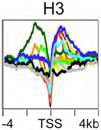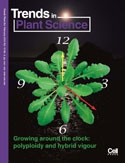
Original definition: The interactions of genes with their environment that bring the phenotype into being (Conrad H. Waddington).
Modern definition: Reversible and heritable changes in gene expression that is independent of primary DNA sequence. Study of mitotically and/or meiotically heritable changes in gene function that cannot be explained by genetic changes (in DNA sequence).
Examples of epigenetic phenomena include: X-chromosome inactivation, gametic imprinting, mating-type switching, telomeric silencing, position-effect variegation (PEV), repeat-induced point mutation (RIP), transgene silencing, transposon inactivation, paramutation, transvection, nucleolar dominance, carcinogenesis, vernalization, and trans-generational changes that cannot be explained by genetic mechanisms.
Epigenome: A collection of biochemical modifications to chromatin that carries genetic information, including but not limited to DNA methylation and histone modifications.
Allelic activation and repression through cis- and trans-acting effects in hybrids or allopolyploids is reminiscent of paramutation, X-inactivation, and repeat-associated gene silencing. However, in hybrids and allopolyploids allelic- and locus-specific expression occurs in a genome-wide scale, which occurs on any chromosomes but does not occur at every locus in a specific chromosome or even in a small chromosomal segment. In some cases, epigenetic regulation is stochastic and takes several generations to establish. In contrast to random inactivation of paternal and maternal X-chromosomes in somatic cells, there is a dominance hierarchy for locus-specific gene expression in allopolyploids. The expression of homoeologous genes, including rDNA loci, is dominant from one parent over the other in the interspecific hybrids or allopolyploids. The dominance phenomenon is similar to paramutagenic and paramutable alleles in paramutation, but the expression of two alleles and loci in the hybrids and allopolyploids is additive, whereas the paramutagenic allele exerts trans-generational effects on the expression of the paramutable allele. Compared with epigenetic silencing of endogenous repeat gene loci, the alleles or homoeologous loci examined in the hybrids and allopolyploids do not have obvious internal repeats. If epigenetic mechanisms are responsible for allelic- and locus-specific gene expression in hybrids and allopolyploids, they probably operate through cis- and trans-acting effects, chromatin modifications, and/or small RNAs that discriminate between homoeologous loci.
Related web information about epigenetics
Epigenetics Wikipedia
The Epigenome Network of Excellence
Ten selected papers about epigenetic regulation of redundant genes
- Bender J, Fink GR: Epigenetic control of an endogenous gene family is revealed by a novel blue fluorescent mutant of Arabidopsis. Cell 83: 725-34 (1995).
- Chandler VL: Paramutation's properties and puzzles. Science 330: 628-9 (2010).
- Feng S, Jacobsen SE, Reik W: Epigenetic reprogramming in plant and animal development. Science 330: 622-7 (2010).
- Henikoff S, Matzke MA: Exploring and explaining epigenetic effects. Trends Genet 13: 293-5 (1997).
- Jenuwein T, Allis CD: Translating the histone code. Science 293: 1074-80. (2001).
- Lee HS, Chen ZJ: Protein-coding genes are epigenetically regulated in Arabidopsis polyploids. Proc Natl Acad Sci U S A 98: 6753-6758 (2001).
- Lee JT, Jaenisch R: The (epi)genetic control of mammalian X-chromosome inactivation. Curr Opin Genet Dev 7: 274-80. (1997).
- Mittelsten Scheid O, Afsar K, Paszkowski J: Formation of stable epialleles and their paramutation-like interaction in tetraploid Arabidopsis thaliana. Nat Genet 34: 450-4 (2003).
- Pikaard CS: The epigenetics of nucleolar dominance. Trends Genet 16: 495-500. (2000).
- Wang J, Tian L, Madlung A, Lee HS, Chen M, Lee JJ, Watson B, Kagochi T, Comai L, Chen ZJ: Stochastic and epigenetic changes of gene expression in Arabidopsis polyploids. Genetics 167: 1961-73 (2004).



